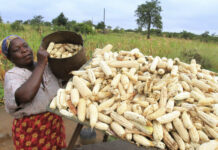
Staff Reporter
After decades of Zanu Pf’s dictatorship, gross human rights violations, corruption and a struggling economy, an increasing number of Zimbabweans fears it’s not yet Uhuru.
On April 18, thousands of people attend Independence Day celebrations around the nation to remember the battle that liberated Zimbabwe from colonial control in 1980. Every year, at the major event, the “eternal flame of independence” is kindled to wish the country well for the future.
Zimbabwe decided to hold the 43rd anniversary in Mt Darwin in memory of young people who came from the province during the liberation struggle.
This is the second time to celebrate the Independence after three years of no celebrations due of the global COVID-19 epidemic that has affected the whole world.
It is also the second time such an event is being held outside Harare after the 2022 commemorations were held in Bulawayo.
A rising majority of Zimbabweans don’t think they have anything to celebrate on this day, despite the coronavirus catastrophe.
When Zimbabwe proclaimed its independence from the British, who governed what was then known as Rhodesia from 1890 until 1979, the majority of Zimbabweans had great expectations.
Positive developments included a thriving economy, political tolerance, participatory democracy, justice, peace, and reconciliation in the early years after independence.
Robert Mugabe, Zimbabwe’s first prime minister and a liberation hero who would later serve as the nation’s long-serving president, oversaw the development of the continent’s best educational and healthcare systems during his early administration. Its fertile regions were referred to as “the breadbasket of Africa.”
However, this has significantly evolved throughout the years.
Despite having an abundance of natural resources like gold, diamonds, and iron ore, Zimbabwe’s economy has collapsed and its residents are struggling to make ends meet.
Political Analyst Obrain Zimbeva said the administration hasn’t felt a sense of responsibility to right certain wrongs. There are no equal possibilities in obtaining national resources, and you cannot talk about independence without mentioning the national anthem and flag.
“The independence gimmick loses value for someone who wakes up every day without access to gasoline, power, water, and other necessities,” said Zimbeva.
However, the country’s long-reigning ZANU PF party feels that simply becoming free from the control of a white minority is cause for celebration.
Critics assert that the liberation war heroes of Zimbabwe, like those of other parts of the continent, frequently have a deeply ingrained feeling of entitlement, which has given rise to an authoritarian political system. The post-liberation generation believes that an older generation holding on to power in a similar fashion to how the colonizers did is also impeding Zimbabwe’s progress.
Emmerson Mnangagwa, who took over as president from Robert Mugabe in 2018, is also a veteran of the liberation guerrilla struggle in Zimbabwe. Key posts in the army, the police, the air force, important institutions of the government, and the ruling party are also held by veterans of war.
The elder generation is experiencing a dilemma because they believe themselves to be heroes for the work they performed to emancipate the nation, according to Zimbeva.













